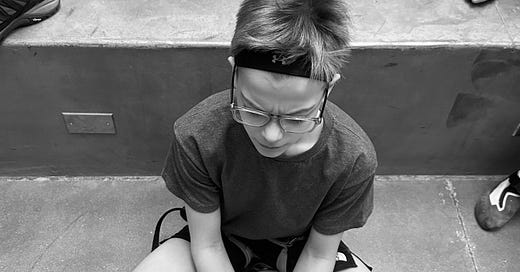“Is it ok, mom?”
“What do you think?”
My son is always looking for approval, sometimes unsure how to move forward with any decision out of fear of what I might think or expect. It often has me wondering, what I did to instill such worry? But then I think back, and I too was a bit like this as a kid - aiming for elusive perfection, always seeking reassurance.
Because of this, I often tell my kids to lean into what they believe and worry less about what others think. I want them to develop the confidence and self-trust to explore who they are and not be so afraid to make mistakes or choose something different than I might.
But it’s not always so simple as ignoring what others think. Three times this week, I noticed myself truly caring what others thought. In none of these cases was I lacking confidence or feeling my independence threatened, rather, I valued external perspective because it helped me better understand the depth of a situation. Perhaps the important distinction comes when we consider how another’s perspective may strengthen rather than weaken our sense of self.
Here were my three revelatory moments of the week, each demonstrating the power of perspective in enhancing our own:
1. Volunteers
For the past eight years, my husband and I have run a local nonprofit that taps into sport as a way to build community, specifically among new American families. Over the past two months, we’ve fielded a record number of requests to get involved - an encouraging trend for which we are truly grateful! This surge in interest has us curious about how more people can become engaged with and advocates for this work. We realized that, while we’ve had many one-on-one conversations with our regular volunteers, we had never formally asked them what they think is working, what keeps them coming back and how we might be able to improve what we do.
To navigate the future and evolve the organization, we needed the strength of their perspective to guide us. So this week, we sought their opinions, sending out a survey to learn more about what they think.
2. Writers
In the writing class I am taking, I am seeing how my fellow classmates’ thoughts and perspectives are making my ideas stronger. Because they are generous enough to share what they think, I’m both challenged by new ideas and have the courage to explore them. The vulnerability of our creative exchanges are bolstering my belief in my abilities as a writer.
3. Elected Officials
In the midst of so much rapid policy change, I’m realizing that one of the only ways to express my thoughts as an individual American is to share them with those who we’ve elected to represent us. When recent decisions deeply impacted our family’s values, we spent time discussing them - reacting to our boys’ questions and seeking their perspective. In drafting letters, I witnessed my boys not only expressing their opinions but explaining why these issues connected to their values. I realize that I want our representatives to care what we think, and in exercising this civic opportunity together, I'm helping my children see how their voices matter in our democracy.
So now I get to teach my kids that, like most things, this concept of caring what others think doesn’t exist as a dichotomy. It’s nuanced, an idea that may be helpful to view through the lens of how different perspectives impact our identity and ideas. It might take some time, but I can get them thinking about situations in which others’ thoughts may illuminate their own path and when another’s judgment may diminish it.
So, next time I hear “Mom, is that ok? What do you think?” Instead of jumping to my quick admonishment reminding him not to worry about what I think, I can dig a little deeper. When might his question be valuable for seeking input - an additional perspective to help him strengthen his own sense of self. Or when might his question be coming from a place of insecurity and worry - a weakening of self. As a parent, we can usually differentiate - we just need to take the time to listen and help our kids (and ourselves) explore the nuance.






Kristi, I love the concept of dichotomy that you’ve presented here. Like you and your son, I often struggle to find a balance when making decisions. One phrase I use to help with this is, "It's not about me." When I apply this mindset, I consider the needs of others a little more. However, if it truly is about me, then I choose what feels good and right for myself with greater confidence. I love your articles and really appreciate you sharing your thoughts.